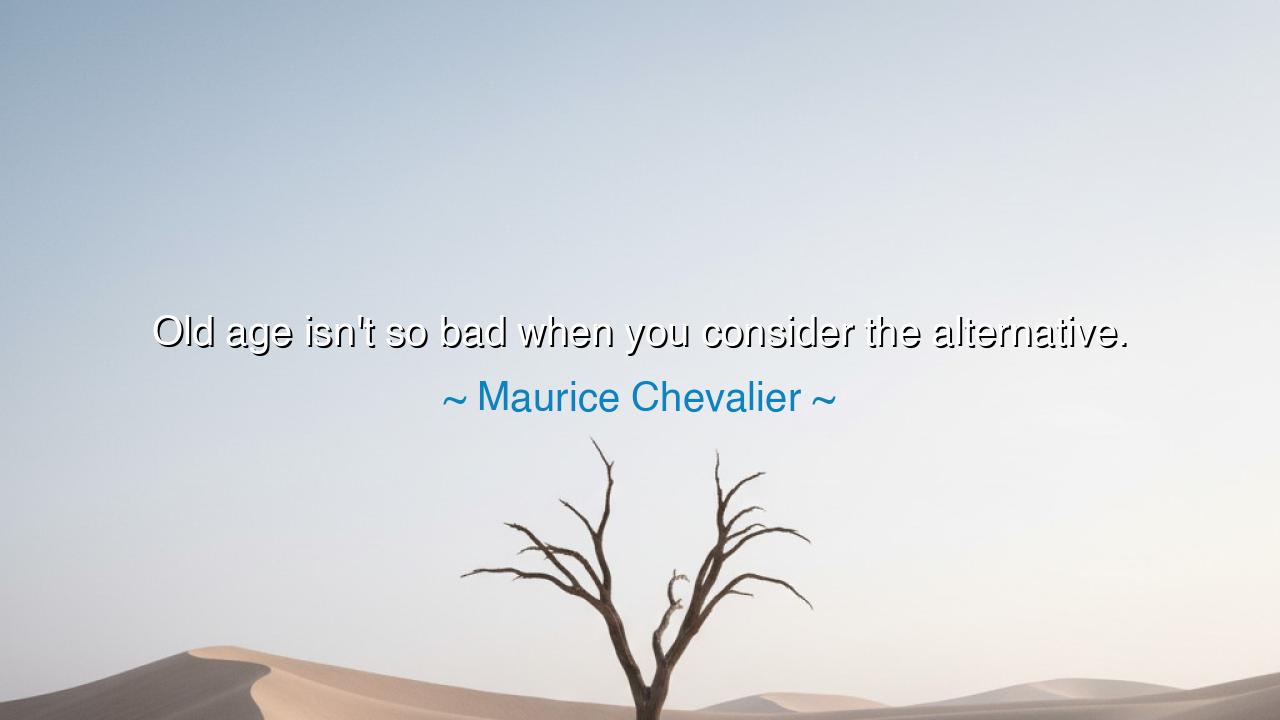
Old age isn't so bad when you consider the alternative.






"Old age isn't so bad when you consider the alternative." These words from Maurice Chevalier offer a powerful perspective on the inevitable progression of life. With characteristic wit, Chevalier reminds us that while old age may bring its own set of challenges—physical decline, the loss of vigor, and the encroaching shadow of mortality—it is, in fact, a far more desirable state than its alternative: death. This reflection calls us to embrace the later stages of life with gratitude, recognizing that the greatest gift of all is the opportunity to continue living, no matter the condition of the body. Old age, in this light, becomes something not to dread, but to appreciate, as it represents the continuation of life—a life that is still filled with possibility, meaning, and experience.
In the wisdom of the ancients, there was a similar appreciation for life in all its stages, particularly old age. The Greek philosopher Aristotle taught that old age was a time of reflection, where one could look back on the years lived and draw meaning from them. He understood that with age came a certain wisdom—a deeper understanding of the world and self. Seneca, the Roman Stoic, also praised the virtues of old age, describing it as a time to reflect on one's life with clarity and acceptance. For Seneca, the struggles of youth were replaced by the peace that comes with experience. In this sense, old age was not to be feared but welcomed as a time of inner growth and contentment.
The life of Marcus Aurelius, the Roman Emperor and Stoic philosopher, serves as a powerful example of how to face old age with grace and wisdom. As he aged, Marcus Aurelius became more reflective, understanding that the physical challenges of his later years were simply part of the human condition. However, his philosophical teachings in Meditations reveal that he did not see old age as something to fear or mourn. Rather, he embraced it as a time to focus more on the mind and the spirit, seeking to live each day with virtue and purpose, regardless of his physical decline. His life shows that old age can be a time of great peace and clarity, if one is able to accept the natural course of life and appreciate the gift of continued existence.
Chevalier’s lighthearted remark invites us to view old age in the same way. While it is true that the body’s strength diminishes and time’s passage becomes ever more palpable, the alternative—death—reminds us that the very fact of living is a miracle. Each additional day of life offers an opportunity to learn, to love, to grow, and to share with others. This understanding can shift our perspective, allowing us to rejoice in the years we have rather than lament their passing. After all, it is only through the gift of time that we can experience all that life has to offer, and each day is precious precisely because it brings us closer to the end. Yet, it is the act of living fully in each moment, despite our physical limitations, that gives life its deepest meaning.
The story of John Glenn, the astronaut and U.S. Senator, offers a living example of Chevalier’s perspective.






AAdministratorAdministrator
Welcome, honored guests. Please leave a comment, we will respond soon